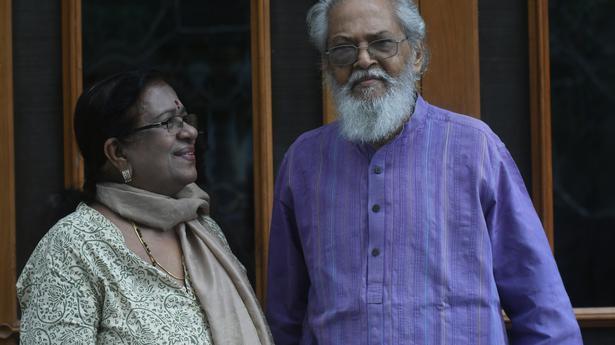
Capturing the life and times of Kumaran Asan on screen
The Hindu
K. P. Kumaran’s biopic on the poet to release on April 8
Gramavrikshathile Kuyil, filmmaker K. P. Kumaran’s biopic on poet Kumaran Asan, is set to release on April 8. After a pandemic-induced stalemate and financial hiccups, the film is finally reaching the audience after three years. “I am overwhelmed. I did not think the film would be released, after so many hurdles,” says Mr. Kumaran.
The 84-year-old director, who is known for his contribution to Kerala’s parallel cinema movement, says a film on Kumaran Asan was a dream project. Asan’s creative genius had a defining influence on Mr. Kumaran. “I don’t, however, call myself a scholar of Asan’s works. This film is for me an inquiry into Asan’s staggering persona with my limited tool,” he says.
“Asan was much more than a poet. He was a philosopher, a social reformer whose quest for knowledge set him apart from the rest. The sheer body of work he created in a span of 20 years (between 1903 and 1924 when he was most active in his literary pursuits), is stunning,” says the filmmaker.
Though Mr. Kumaran does not refer to his film as a conventional biopic, he says it includes the important events in Asan’s life – his education, his years with Sree Narayana Guru and the events that marked the poet’s last few years. The narrative style is simple, yet abstract. “We have tried a lot of experiments at the editing table. To capture Asan’s life in its entirety is impossible, but his poetry has been evoked through the use of visuals and effects.”
Carnatic musician Sreevalsan J. Menon plays Asan in the film. “I wanted someone who had a resemblance to Asan and could do justice to the poetic aspect of the narrative,” says Mr. Kumaran. Sreevalsan has also composed the music and the background score for the film.
Most parts of Gramavrikshathile Kuyil was shot at Perumbalam, an island in Alappuzha and on the banks of the Periyar. Produced by Mr. Kumaran’s wife, N. Santhamma Pillai, the film has been edited by Ajith Kumar. The cinematography is by K.G. Jayan.
The current socio-cultural scenario in Kerala makes Kumaran Asan and his works all the more relevant, says Mr. Kumaran. “He played a key role in Kerala’s transition to modernity. He was a poetic symbol of renaissance. It is important that we talk about Asan,” he says.





















 Run 3 Space | Play Space Running Game
Run 3 Space | Play Space Running Game Traffic Jam 3D | Online Racing Game
Traffic Jam 3D | Online Racing Game Duck Hunt | Play Old Classic Game
Duck Hunt | Play Old Classic Game











